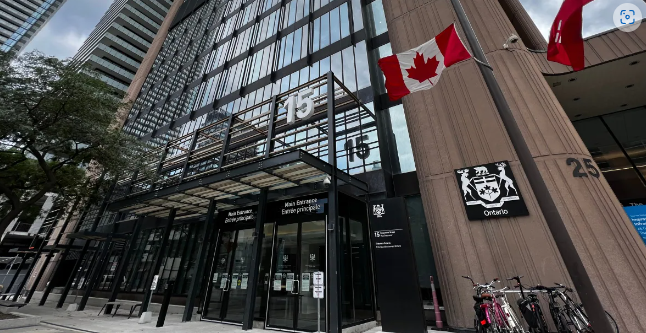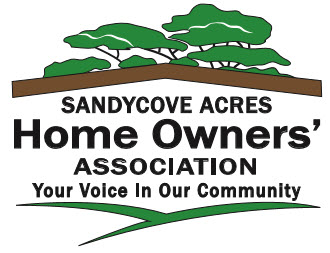The Residential Tenancies Act
This information is provided for the residents of Sandycove Acres. Please read the following summarization of the Act or click on the links provided to read the Act in it’s entirety.
What You Should Know About
The Residential Tenancies Act
for additional information please click here
THE INFORMATION CONTAINED HEREIN IS PROVIDED AS GENERAL INFORMATION ONLY AND MEANT AS A GUIDE. IT IS NOT INTENDED TO BE LEGAL OR PROFESSIONAL ADVICE. EACH SITUATION IS DIFFERENT AND DEPENDS UPON THE FACTS. TENANTS SHOULD OBTAIN PROFESSIONAL LEGAL ADVICE BEFORE TAKING ANY ACTION. THE LAW CONSTANTLY CHANGES AND THE INFORMATION PROVIDED IN THIS BROCHURE IS ASSUMED TO BE CORRECT AS AT THE DATE IT WAS PRODUCED.
Provided by The Sandycove Home Owners’ Association
What You Should Know About The Residential Tenancies Act
Sandycove Acres is a ‘residential complex’ covered by the Residential Tenancies Act.

A lease or tenancy agreement may be written, oral or implied. You do not need to have a written tenancy agreement (lease), but a written agreement gives you a record of things agreed to by you and the landlord. Note that the tenancy agreement may not contain any rules or conditions that are not allowed by the Act.
The landlord must also provide a written copy of any rules and regulations and written notification of any changes.
How is the rent on a rental unit decided? All units in Sandycove are governed by the rent control provisions of The Residential Tenancies Act. Therefore rents cannot be increased except in accordance with the provisions of that Act. As with any other rental unit, when one tenancy terminates and a new tenancy begins with a new tenant, the Landlord is free to set the rents as he chooses. When you sell your unit you must be careful to follow a certain procedure (see the paragraph entitled “Assignment of existing tenancy agreement”).
What about rent increases? After your tenancy starts, the landlord is allowed to increase the rent once every 12 months but only by the guideline set each year by the Ministry of Municipal Affairs and Housing based on the Consumer Price Index for Ontario published in August of the preceding year
A landlord can apply to the Board for an increase above the guideline if:
The landlord’s costs for municipal taxes and charges, and/or utilities (such as fuel, electricity or water) have increased significantly, or
The landlord has done major repairs or renovations (these are called capital expenditures), or the landlord has operating costs for security services performed by persons who are not employees of the landlord.
Rent increases for capital expenditures or security services cannot be more than 3% above the guideline each year. If the landlord justifies an increase that is more than 3% above the guideline, the increase can be taken over three years, at a rate of up to 3% above the guideline per year. For increases in the cost of municipal taxes and charges, and/or utilities, there is no limit on the amount of rent increase that can be approved.
When a landlord finishes paying for capital expenditures sitting tenants whose rents were increased based on these capital expenditures will have their rents reduced accordingly.
Before a landlord is allowed to pass costs onto tenants, there is a stricter test to decide if the capital expenditure is really necessary.
Above guideline rent increases are not allowed for routine maintenance or repair. Work must be extraordinary or significant to qualify for an increase. Above guideline rent increases are not allowed for projects that are substantially cosmetic in nature, or that enhance the level of prestige or luxury of a building.
The rent increase for certain items is spread out over more years, so the tenant will be paying less per year.
Landlord must notify a tenant of a rent increase.
You must receive 90 days written notification of the amount of increase before a rent increase is to start.
Rent payments
A new tenant cannot be required to pay rent by post-dated cheques or automatic debit but once you have agreed on a method of payment of rent, it cannot be changed unless both you and the landlord agree. However, if you request, the landlord must provide rent receipts for any payment or deposit, free of charge.

You have the right to sell or lease your home without the landlord’s consent. However, since the rental of the site is through an agreement with the landlord, you must sublet the site rental agreement. The landlord’s consent to sublet the site is required, but the landlord cannot refuse without a good reason.
You should be careful in a sale of your unit. The purchaser is extremely interested in the amount of rent that he/she is going to pay and if that purchaser is expecting that the rent will only go up by what is called “the prescribed amount” (usually $50.00) they may try to back out of your deal if the rent is going up by an amount which is more than that. You should not surrender your lease. Instead, you should, once you have sold your unit make a request in writing to the Landlord for consent to assign your tenancy. You should do this at least 15 days prior to any closing and preferably at the earliest opportunity but not until your purchaser has waived all conditions.
Landlord’s right of first refusal If you receive an acceptable offer to purchase your home, you must give the landlord 72 hours notice of the offer to purchase and the landlord has a right of first refusal to purchase the home at the price and subject to the terms and conditions in the offer.
Landlord as agent You are free to choose how you wish to sell or lease your home. The landlord may act as your agent in negotiations to sell or lease your home only in accordance with a written agency contract entered into for the purpose of beginning those negotiations. Please note that the agency contract may not be the same as a “listing” agreement with a realtor.
Advertising a sale If the landlord provides a bulletin board for the purpose of placing a “for sale” advertisement, you may not place a for sale sign on your home.
Information about property assessment If you pay a landlord an amount to reimburse the landlord for property taxes paid by the landlord with respect to your home and the landlord obtains information from the Municipal Property Assessment Corporation with respect to the value of the home for assessment purposes, the landlord must promptly provide you with a copy of that information.
Responsibility of landlord A landlord is responsible for, removing or disposing of garbage, maintaining park roads in a good state of repair; removing snow from park roads; maintaining the water supply, sewage disposal, fuel, drainage and electrical systems in the park in a good state of repair; maintaining the park grounds and all buildings, structures, enclosures and equipment intended for the common use of tenants in a good state of repair; and repairing damage to a tenant’s property, if the damage is caused by the willful or negligent conduct of the landlord.
A supply of potable water and water pressure that are sufficient for normal household use shall be available for each rental unit in a land lease community. An adequate supply of water and adequate water pressure shall be available for fire fighting. Fire hydrants owned by the landlord shall be regularly tested and maintained and kept free from accumulations of snow and ice.
Roads within a land lease community shall be kept free of holes and cleared of snow and obstructions; maintained to control dust and kept passable. Excavations made for repairs shall be filled in and the ground returned to its previous condition. Mailboxes and the approaches to them shall be kept free of snow and other obstructions.
Electrical supply and connections in a land lease community supplied by the landlord shall be maintained free of conditions dangerous to persons or property
Offences If you believe that the landlord has committed an offence, you may choose to:
Report an offence to the Investigation & Enforcement Unit of the Ministry of Municipal Affairs and Housing at 1-888-772-9277 OR
Apply to the Landlord and Tenant Board (the Board) at 1-888-332-3234
